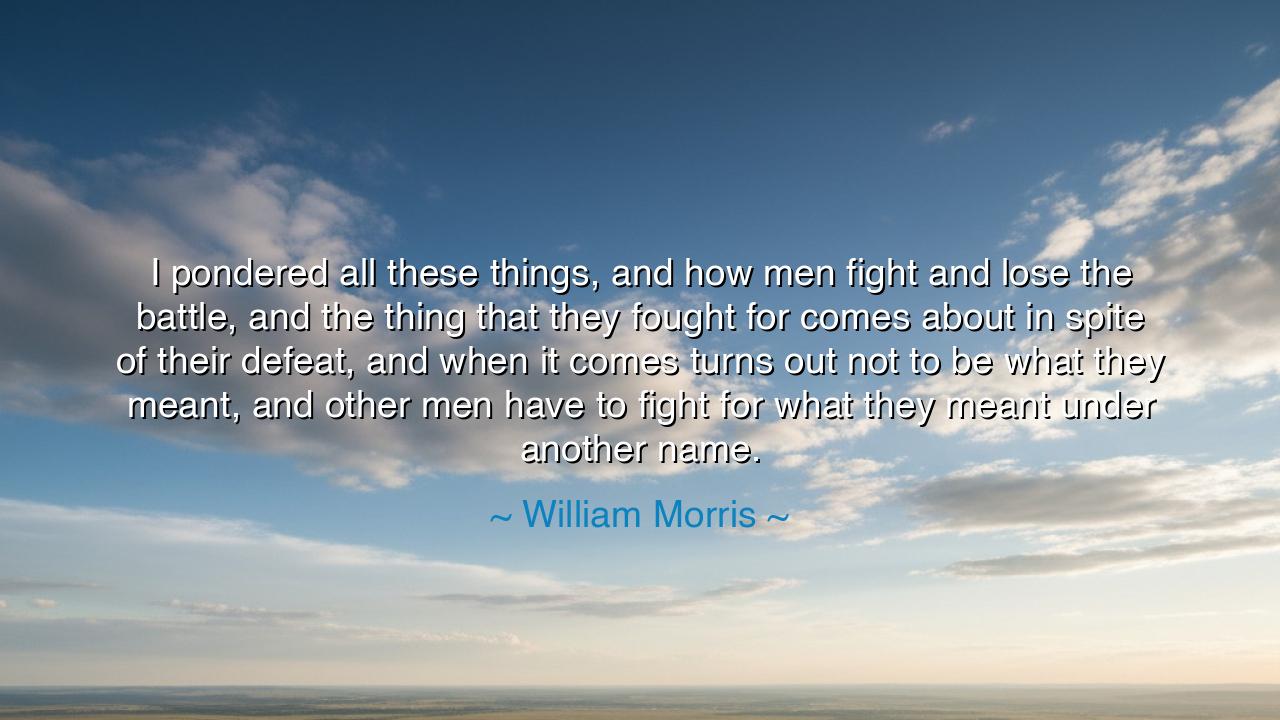
I pondered all these things, and how men fight and lose the
I pondered all these things, and how men fight and lose the battle, and the thing that they fought for comes about in spite of their defeat, and when it comes turns out not to be what they meant, and other men have to fight for what they meant under another name.






Hear the solemn reflection of William Morris, poet, craftsman, and dreamer of justice: “I pondered all these things, and how men fight and lose the battle, and the thing that they fought for comes about in spite of their defeat, and when it comes turns out not to be what they meant, and other men have to fight for what they meant under another name.” These words are heavy with the weight of history, the bitter wisdom of one who has watched generations rise with hope, fall in struggle, and yet leave behind seeds that others must tend. In them is the mystery of progress: that the battles of men rarely end as they intend, and that the truth of their labor often appears in forms unrecognizable to them.
The origin of these words lies in Morris’s life and his times. A man of the nineteenth century, he lived amidst the fires of industrial revolution, the rise of socialism, and the dreams of art restored to the dignity of craft. He saw noble causes falter, movements splinter, and hopes betrayed by the very victories they achieved. His insight was not born of despair but of deep observation: that human striving is never finished, that the march of justice is crooked and halting, and that each generation inherits both the victories and the failures of those before.
The quote tells us first of defeat. Men fight with passion, with courage, with the belief that their cause is just—yet often they fall. Armies are crushed, revolutions suppressed, reforms delayed. And yet, says Morris, the thing they fought for sometimes emerges later, not because of their triumph, but despite their defeat. Their blood and tears water the soil, and others come after to reap what they could not. Thus history advances, not smoothly, but through sacrifice and failure that still carries meaning.
Yet there is tragedy here also. When the longed-for victory arrives, it is often twisted, diminished, or corrupted. What was once a cry for freedom becomes bureaucracy; what was once a vision of equality becomes compromise. The thing that they fought for is not what they meant, and so the work must begin again. Thus the abolition of slavery gave way to the struggles against segregation; the revolutions for liberty gave rise to new tyrannies. Always, other men have to fight again, under another name.
Consider the story of the French Revolution. Men cried for liberty, equality, fraternity. They overthrew monarchy, but what followed was terror and then empire. Their cause, though triumphant in name, was distorted in form. And yet their cry did not die. Across Europe and the world, generations picked up the fight again, reshaping it under new names: democracy, suffrage, rights for workers and women. In this, Morris’s words echo true—each struggle gives birth not to a perfect fulfillment, but to another struggle, another fight for the truest meaning of the cause.
This is both sobering and heroic. Sobering, for it reminds us that no victory is final, no cause is fully realized in its first triumph. Heroic, for it calls us not to despair when battles are lost or when victories sour. Our efforts are not wasted. Even in defeat, we plant seeds. Even in corrupted victories, we prepare the ground for new battles where others may fight with clearer vision. To live is to join the unbroken chain of strivers who hand down the torch across centuries.
The lesson is this: fight with courage, knowing you may not see the fulfillment of your labor. Speak truth, though it may be twisted. Build, though what you build may be broken. For what matters is not that your cause is finished in your lifetime, but that it is carried forward. And when you inherit the victories of others, do not worship them blindly. Ask if they are what was truly meant, and if not, be ready to fight again under another name.
Therefore, O seekers, let Morris’s words guide your spirit: the struggle is unending, yet never in vain. Every defeat is a seed, every false victory a call to deeper truth. Take your place in the great procession of humanity, neither despairing of failure nor complacent in success. For in the eternal wrestling of men and time, it is not one generation but all generations together that bend history toward justice.






AAdministratorAdministrator
Welcome, honored guests. Please leave a comment, we will respond soon